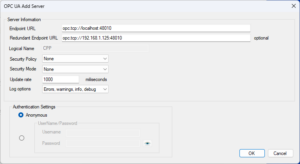OPC UA redundant servers play a critical role in industrial and automation systems by enhancing reliability, ensuring continuous operation, and minimizing downtime. Here’s why they are important:
1. High Availability
- Redundant servers ensure uninterrupted communication by allowing a backup server to take over if the primary server fails.
- This is critical for industries where downtime can result in significant financial loss or safety hazards, such as manufacturing, utilities, and healthcare.
2. Fault Tolerance
- A redundant OPC UA server setup ensures that system failures (e.g., hardware, software, or network issues) do not lead to complete system breakdown.
- By distributing the workload and switching to a backup server, the system remains operational.
3. Improved System Reliability
- Redundancy increases the overall system’s reliability by ensuring that data is always available and services are not disrupted.
- This helps maintain critical processes and data integrity, especially in real-time monitoring systems.
4. Load Balancing
- Some redundant configurations support load balancing, where client requests are distributed across multiple servers to optimize resource utilization and performance.
5. Disaster Recovery
- In the event of a primary server failure, the backup server seamlessly takes over, preventing data loss and ensuring that ongoing processes are unaffected.
- This makes recovery faster and more efficient.
6. Regulatory Compliance
- In industries where compliance and reporting standards require consistent data logging and availability, redundant servers help meet these obligations without interruption.
7. Scalability
- Redundant server setups are easily scalable to support growing system demands, accommodating more clients or data points as needed.
8. Client Transparency
- OPC UA supports built-in mechanisms for redundancy, allowing client applications to automatically detect and switch to a backup server without manual intervention, reducing complexity and improving user experience.
In case the EBO-OPC Client fails to connect with the primary OPC UA server, it will automatically switch to the secondary (redundant) OPC UA server. In case the EBO-OPC Client fails to connect with the secondary OPC UA server, it will automatically switch to the primary OPC UA server.
The EBO-OPC Client’s OPC UA redundancy ensures systems meet the high standards of reliability, safety, and performance that modern industries demand.


